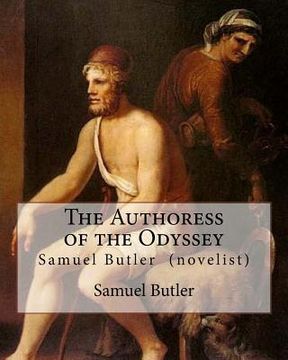The Authoress of the Odyssey By: Samuel Butler (novelist): Samuel Butler developed a theory that the Odyssey came from the pen of a young Sicilian wom (en Inglés)
Reseña del libro "The Authoress of the Odyssey By: Samuel Butler (novelist): Samuel Butler developed a theory that the Odyssey came from the pen of a young Sicilian wom (en Inglés)"
Samuel Butler developed a theory that the Odyssey came from the pen of a young Sicilian woman, and that the scenes of the poem reflected the coast of Sicily and its nearby islands. He described the "evidence" for this theory in his The Authoress of the Odyssey (1897) and in the introduction and footnotes to his prose translation of the Odyssey (1900)................ Samuel Butler (4 December 1835 - 18 June 1902) was the iconoclastic English author of the Utopian satirical novel Erewhon (1872) and the semi-autobiographical Bildungsroman The Way of All Flesh, published posthumously in 1903. Both have remained in print ever since. In other studies he examined Christian orthodoxy, evolutionary thought, and Italian art, and made prose translations of the Iliad and Odyssey that are still consulted today. He was also an artist. CAREER: After Cambridge he went to live in a low-income parish in London 1858-59 as preparation for his ordination into the Anglican clergy; there he discovered that baptism made no apparent difference to the morals and behaviour of his peers and began questioning his faith. This experience would later serve as inspiration for his work The Fair Haven. Correspondence with his father about the issue failed to set his mind at peace, inciting instead his father's wrath. As a result, he emigrated in September 1859, on the ship Roman Emperor to New Zealand. Butler went there like many early British settlers of privileged origins, to put as much distance as possible between himself and his family. He wrote of his arrival and life as a sheep farmer on Mesopotamia Station in A First Year in Canterbury Settlement (1863), and made a handsome profit when he sold his farm, but the chief achievement of his time there was the drafts and source material for much of his masterpiece Erewhon. Erewhon revealed Butler's long interest in Darwin's theories of biological evolution. In 1863, four years after Darwin published On the Origin of Species, the editor of a New Zealand newspaper, The Press, published a letter captioned "Darwin among the Machines." Written by Butler but signed Cellarius (q.v., ) it compares human evolution to machine evolution, prophesying that machines would eventually replace man in the supremacy of the earth: "In the course of ages we shall find ourselves the inferior race." The letter raises many of the themes now debated by proponents of the technological singularity, i. e. that computers evolve much faster than humans and that we are racing towards an unknowable future through explosive technological change. Butler also spent much time criticising Darwin, partly because Butler (himself a man living in the shadow of a previous Samuel Butler) believed that Darwin had not sufficiently acknowledged his grandfather Erasmus Darwin's contribution to the origins of his theory. Butler returned to England in 1864, settling in rooms in Clifford's Inn (near Fleet Street), where he lived for the rest of his life. In 1872, the Utopian novel Erewhon appeared anonymously, causing some speculation as to the identity of the author. When Butler revealed himself, Erewhon made him a well-known figure, more because of this speculation than for its literary merits, which have been undisputed. In 1839 his grandfather Dr Butler had left Samuel property he owned at Whitehall in Shrewsbury on the condition that he survived his own father and his aunt, Dr Butler's daughter Harriet Lloyd. While at Cambridge in 1857 he sold the Whitehall mansion and six acres to his cousin Thomas Bucknall Lloyd, but kept the remaining land surrounding the mansion. His aunt died in 1880 and his father's death in 1886 resolved his financial problems for the last sixteen years of his own life. The land at Whitehall was sold for housing development and he laid out and named four roads - Bishop and Canon Streets after his grandfather's and father's clerical titles, Clifford Street after his London home, and Alfred Street in gratitude to his cler

